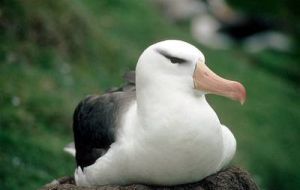MercoPress. South Atlantic News Agency
South Georgia mentioned as example of longline fisheries seabirds protection
 Albatrosses are one of the most threatened species by longline fishing
Albatrosses are one of the most threatened species by longline fishing A new global estimate of the impact of longline fisheries on seabirds reveals that, despite efforts to reduce seabird deaths, upwards of 300,000 birds are still being killed every year. However South Georgia is praised for having imposed strict regulations that have seen seabird deaths as bycatch drop by 99%.
The study published in the science journal Endangered Species Research, carried out by scientists from the RSPB and BirdLife International. Publication is a powerful reminder of how far needs to be done to ensure ecologically responsible fishing.
Since the 1980s, scientists have linked global declines of albatrosses and other seabirds with ‘incidental catch’ in longline fisheries. Adult and juvenile birds become snared on hooks attached to the lines, which can be over a hundred kilometers long, and are dragged underwater to a premature death.
Dr Orea Anderson, policy officer for the Global Seabird Program and lead author of this study, said: “It is little wonder that so many of the affected seabird species are threatened with extinction, their slow rate of reproduction is simply incapable of compensating for losses on the scale this study has demonstrated.”
A major factor determining this huge estimate is the emergence of fleets, with previously unaccounted for by-catch problems, adding to the global tally. While some fisheries have reduced their impacts on seabirds, we are only just becoming aware of problems in others - hampered by a lack of data.
The Spanish longline fleet on the Gran Sol grounds off SW Ireland is one such fleet, with preliminary data suggesting it may be responsible for killing large numbers of seabirds, potentially upwards of 50,000 annually, mostly shearwaters and fulmars. The Japanese tuna fleet came second in scale – over 20,000 killed each year, but with the largest impact on albatrosses.
Despite an exhaustive review, substantial data gaps remain (Nordic, Asian distant water, and Mediterranean fleets) and until these are filled it is impossible to gauge the true impact of global longline activities on seabirds. However, the continued declining trends in many seabirds remain a cause for grave concern. Seventeen out of 22 albatross species are threatened with extinction with the main threat coming from mortality in fisheries.
Some fisheries have enforced strict regulations, resulting in substantial by-catch reductions in recent years. Seabird deaths around South Georgia in the CCAMLR zone of the Southern Ocean have declined by 99% since regulations were enforced. South Africa achieved a drop of 85% by-catch in its foreign-licensed fleet in 2008, when a cap was placed on the number of seabird deaths permitted. More recently, in April 2011, Brazil passed a law requiring the use of stringent seabird by-catch measures in their domestic tuna longline fleets.
But the problem is so global in scale that every fishing nation has a role to play in alleviating this needless waste of marine life.
RSPB and BirdLife International’s Global Seabird Programme call on regional fisheries management organizations and industry to protect seabirds through the use of simple, cost-effective mitigation measures that have been proven to reduce the threat of bycatch.
They are also working to be part of the solution: the Albatross Task Force, founded by the RSPB and BirdLife International, works directly with fishermen and fishery managers in seven countries (bycatch hotspots) worldwide to reduce the number of seabirds being killed. Dr. Cleo Small, senior policy officer for the Global Seabird Program and co-author of the review, commented: “Using simple bird-scaring lines and weighting of hooks as they enter the water could dramatically reduce the number of seabirds being killed.
“With the UK’s Overseas Territories in the South Atlantic holding a third of the world’s breeding albatrosses, the UK has a major responsibility to ensure seabird-friendly fisheries. As for the EU, the findings of this review place a heavy onus on the forthcoming EU Plan of Action for Seabirds to deliver a robust set of remedial measures capable of reducing the impact of longline and other fisheries on seabird populations in EU waters and beyond.”




Top Comments
Disclaimer & comment rules-

-

Read all commentsdont worry little birdies,
Jul 12th, 2011 - 02:37 pm 0we wont let those nasty argies get hold of you .
naughty argentinians always trying to grab everything ,
the loyal trustworthy british will protect you, lol.
Well said Briton, and if the silly Argies had not thrown a tantrum and dropped their teddy out of their pram and broken of the politically NEUTRAL fisheries conservation talks with the Islands over the SW Atlantic several years ago - a lot more seabirds could be alive today!
Jul 13th, 2011 - 09:34 pm 0But then that,s Argentina- ”self -self and to hell with he worlds environmentn and resources!
Commenting for this story is now closed.
If you have a Facebook account, become a fan and comment on our Facebook Page!